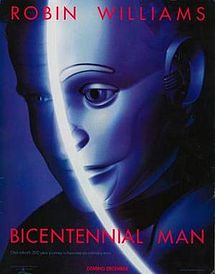 I think I mentioned in my review of The Final Cut that Robin Williams is generally in movies that have a certain formula to them, and Bicentennial Man follows that formula all the way. The formula is that Robin Williams plays a character who carries a certain happiness with him, but the rest of society just doesn’t see it that way. Robin Williams then does his best to be even more of himself, and he changes the society for the better.
I think I mentioned in my review of The Final Cut that Robin Williams is generally in movies that have a certain formula to them, and Bicentennial Man follows that formula all the way. The formula is that Robin Williams plays a character who carries a certain happiness with him, but the rest of society just doesn’t see it that way. Robin Williams then does his best to be even more of himself, and he changes the society for the better.
This may not have been in the aforementioned The Final Cut, but it was in Dead Poet’s Society, Mrs. Doubtfire, and Patch Addams. Although I could say that Bicentennial Man was written with Williams in mind, it is adapted from a work from science fiction masters Isaac Asimov and Robert Silverberg.
If you aren’t familiar with Asimov, he was very famous for his robot stories, and established the Three Laws of Robotics that are at play in this film. I won’t bother explaining them because I assume you are reading this on a computer or some device connected to the Internet, and you can just look it up.
Bicentennial Man is about a robot who is purchased by a family in the year 2005. Yes, we didn’t have robots that were that advanced by then, and I have no idea if we ever well. This film came out in 1999! Did they really think we would have advanced robots in every household by then? Never put a year on your speculative fiction film.
Anyway, Robin Williams plays this robot who wants to be more human as his family treats him not as a servant, but an equal. The even give him a name, Andrew, and he even develops a love for the youngest of the family, who he refers to as “Little Miss”. You might see that as somewhat creepy, and I’ll discuss this at length after the jump.
Andrew longs to be more than a robot, and he longs to be free from his family. Not because he is treated as a slave, but because he cannot leave. His owner grants him his freedom, and realizes that in order to be more human, Andrew must be separated from the family. There is a lot of genuinely good emotions and lessons to be learned from those scenes, and I will have to say that is why this film works for me. The film is willing to question the things that make us human.
The biggest problem that I had with this film is that it seems preachy. Eventually, Andrew figures out how to graft artificial skin and other organs onto himself, making him almost completely human. Eventually, he falls in love with Little Miss’ granddaughter, and he even has procedures done that allow him to have sex with her.
Of course, society won’t accept robot/human pairing, which makes this film feel like some big metaphorical statement for gay marriage. I have seen some films that seem rather preachy before, on the liberal and conservative agenda. I don’t want to reject Bicentennial Man because it deals with a robot/human pairing, as I think it does a good job of portraying a robot that wants to become more human.
After all, we might be looking at a future where we are trying to create robots to do the work for us. Do we really think that in programming robots to do our work, that they won’t want to become more human? Well, if we teach them to think, then of course, but can’t we just not teach them to think? Why does science-fiction assume that all robots will somehow become self-aware? Why would creators want to put stuff like that on our robots?
Then again, we don’t really know what truly makes us human, which makes me wonder how successful we would be if we tried to transfer sentience to robots. If we ever succeed in that, then we can talk about whether or not robots and humans should marry. Until then, should we even be thinking about that?
Leave a Reply